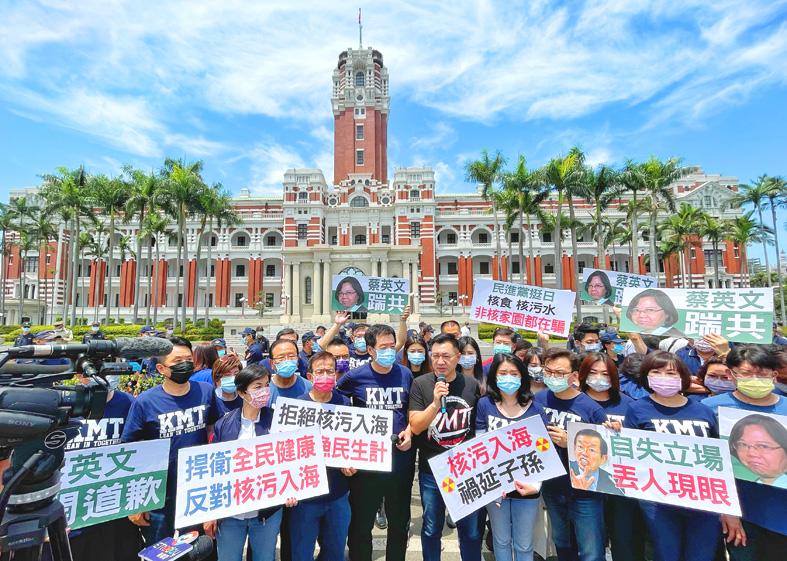The Chinese Nationalist Party (KMT) caucus yesterday demanded that President Tsai Ing-wen (蔡英文) remove Frank Hsieh (謝長廷) as the nation’s representative to Japan and issue a public apology over his statements about wastewater discharge.
Japan on April 13 announced that it plans to release treated wastewater from the disabled Fukushima Dai-ichi nuclear power plant into the ocean, despite protests from neighboring countries.
While he lodged a protest to Tokyo on behalf of the government, Hsieh said in a Facebook post that he could not overlook the fact that Taiwan also discharges water from three nuclear power plants into the ocean.

Photo: Liu Hsin-de, Taipei Times
The KMT on Thursday last week reported to the National Police Agency that it suspected Hsieh of spreading disinformation, and KMT lawmakers have since demanded that Hsieh attend a legislative meeting to report on Taiwan-Japan relations.
KMT Legislator Alex Fai (費鴻泰) yesterday said that South Korea, China, the Philippines and Russia have all voiced their complaints about Japan’s decision, while Taiwan’s representative spoke up for Japan and alleged that Taiwan was doing the same thing.
Fai quoted Atomic Energy Council Minister Hsieh Shou-shing (謝曉星) as saying that the wastewater Taiwan discharges meets normal standards and is different from the situation at the Japanese plant, which was destroyed during the March 11, 2011, earthquake and tsunami.
Fai accused Frank Hsieh of treason, and said his comments and action made him unsuitable to represent Taiwan’s interests abroad.
Fai said he was astonished that Tsai concurred with Hsieh’s comments, adding that such comments and actions were akin to denigrating the Republic of China (ROC) before Japan.
KMT lawmakers yesterday marched to the Presidential Office to voice their complaints.
They also demanded that the Tsai administration lodge formal complaints with the Japanese government on discharging contaminated water into the sea, remove Hsieh from his post and actively participate in international efforts to monitor Japan’s handling of wastewater.
In response, the Presidential Office said that Hsieh has adequately conveyed the Taiwanese government’s concern regarding its plan to pump irradiated water out to sea in two years.
The opposition party’s political machinations are not conducive to furthering and deepening Taiwan-Japan relations, it said, adding that stirring up hatred against Japanese is not helpful to maintaining peace and stability in the region.
Additional reporting by Lee Hsin-fang

‘DENIAL DEFENSE’: The US would increase its military presence with uncrewed ships, and submarines, while boosting defense in the Indo-Pacific, a Pete Hegseth memo said The US is reorienting its military strategy to focus primarily on deterring a potential Chinese invasion of Taiwan, a memo signed by US Secretary of Defense Pete Hegseth showed. The memo also called on Taiwan to increase its defense spending. The document, known as the “Interim National Defense Strategic Guidance,” was distributed this month and detailed the national defense plans of US President Donald Trump’s administration, an article in the Washington Post said on Saturday. It outlines how the US can prepare for a potential war with China and defend itself from threats in the “near abroad,” including Greenland and the Panama

A wild live dugong was found in Taiwan for the first time in 88 years, after it was accidentally caught by a fisher’s net on Tuesday in Yilan County’s Fenniaolin (粉鳥林). This is the first sighting of the species in Taiwan since 1937, having already been considered “extinct” in the country and considered as “vulnerable” by the International Union for Conservation of Nature. A fisher surnamed Chen (陳) went to Fenniaolin to collect the fish in his netting, but instead caught a 3m long, 500kg dugong. The fisher released the animal back into the wild, not realizing it was an endangered species at

The High Prosecutors’ Office yesterday withdrew an appeal against the acquittal of a former bank manager 22 years after his death, marking Taiwan’s first instance of prosecutors rendering posthumous justice to a wrongfully convicted defendant. Chu Ching-en (諸慶恩) — formerly a manager at the Taipei branch of BNP Paribas — was in 1999 accused by Weng Mao-chung (翁茂鍾), then-president of Chia Her Industrial Co, of forging a request for a fixed deposit of US$10 million by I-Hwa Industrial Co, a subsidiary of Chia Her, which was used as collateral. Chu was ruled not guilty in the first trial, but was found guilty

The Chinese Nationalist Party (KMT) is maintaining close ties with Beijing, the Democratic Progressive Party (DPP) said yesterday, hours after a new round of Chinese military drills in the Taiwan Strait began. Political parties in a democracy have a responsibility to be loyal to the nation and defend its sovereignty, DPP spokesman Justin Wu (吳崢) told a news conference in Taipei. His comments came hours after Beijing announced via Chinese state media that the Chinese People’s Liberation Army’s Eastern Theater Command was holding large-scale drills simulating a multi-pronged attack on Taiwan. Contrary to the KMT’s claims that it is staunchly anti-communist, KMT Deputy